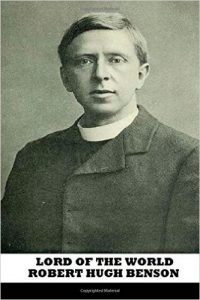 Lord Of The World is a highbrow, Catholic version of Left Behind, written by a priest, Msgr. Robert Hugh Benson, in 1907. It is an apocalypse and theologically directed at Catholics, rather than at Protestants of the a premillennial dispensationalism bent. What makes it fascinating is that Pope Francis has repeatedly recommended it, no common thing in an apocalypse and not what you’d expect from a Pope reputed to be a theological liberal, and its predictive views, in 1907, of politics and technology.
Lord Of The World is a highbrow, Catholic version of Left Behind, written by a priest, Msgr. Robert Hugh Benson, in 1907. It is an apocalypse and theologically directed at Catholics, rather than at Protestants of the a premillennial dispensationalism bent. What makes it fascinating is that Pope Francis has repeatedly recommended it, no common thing in an apocalypse and not what you’d expect from a Pope reputed to be a theological liberal, and its predictive views, in 1907, of politics and technology.
The book is built around II Thessalonians 2:3: “Let no man deceive you by any means: for that day shall not come, except there come a falling away first, and that man of sin be revealed, the son of perdition, who opposeth and exalteth himself above all that is called God, or that is worshipped; so that he as God sitteth in the temple of God, shewing himself that he is God..” Father Benson’s book pictures that falling away and that man of sin, the Antichrist, and the reaction of the people of the time (late 20th Century).
Other reviewers have pointed out Msgr. Benson’s prescient descriptions of 20th Century technology. H.G. Wells is normally held up as an amazing predictor of future technology, but he wrote most of his predictions later. Msgr. Benson posits what are in effect nuclear weapons; commercial powered intercontinental air travel and instantaneous communications. He also predicts other modern non-technological happenings—not just a falling-away from religion, but other depravities, such as the mainstreaming of euthanasia (a common thread in morally-centered dystopias, back to Miller’s A Canticle For Leibowitz).
Even more interesting to the modern reader is that Msgr. Benson posits that the entire West has adopted Communism and is rich and happy, with a high degree of political freedom (at least until the Antichrist shows up and is made dictator by acclamation). Nowadays we see this as bizarre, because we correctly associate Communism, in every incarnation, with mass killing, totalitarianism, and grinding poverty for all but the ruling classes. But in 1907 it was possible to think, and most of the educated classes did think, that Communism might be the future. Live and learn.
Of course, there are plenty of predictions that don’t hold up. We don’t all speak Esperanto (or Latin, if churchmen). London hasn’t moved primarily underground. Nonetheless, none of these predictions are central to the story or detract from the flow of the story.
As Richard Posner said, “It is in the nature of apocalypses that each is falsified—except the last.” The Antichrist does not seem around the corner, and the reception by humanity of the Antichrist character in Lord Of The World, where essentially all humans simply defer to him for no real reason and nobody shrieks “The Emperor has no clothes!”, seems odd to us. But perhaps it always would seem odd, until it didn’t. Certainly some parts of this book resonate with the 21st Century, particularly the persecutions of Christians in the Middle East and the growing marginalization of actual Christian belief in the West, where anyone with actual Christian beliefs is increasingly openly and deliberately excluded from the cultural elite and the centers of business, law, science and medicine. Maybe the Antichrist is not around the corner. But maybe he is. We will find out, or our descendants will.
